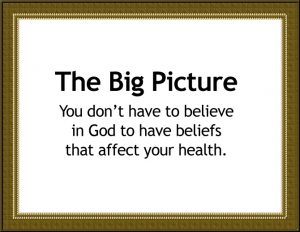Spirituality
Questions & Answers • Tools
Overview: According to the American Academy of Family Physicians, “spirituality is the way you find meaning, hope, comfort and inner peace in your life. Many people find spirituality through religion. Some find it through music, art or a connection with nature. Others find it in their values and principles.”
Why is a medical organization like the Academy defining spirituality? What does spirituality have to do with health and health disparities? And should health care providers address the spiritual concerns of their patients?
Recent medical studies indicate that people who describe themselves as spiritual exhibit fewer self-destructive behaviors (suicide, smoking, and drug and alcohol abuse, for example), less stress, and a greater total life satisfaction. Spirituality has been shown to reduce depression, improve blood pressure, and boost the immune system. More information about the links between spirituality and health will emerge over time.
Spirituality: Questions & Answers
Tips on providing equitable treatment for people of all beliefs
- What is the difference between spirituality and religion?
- How can talking about spiritual or religious beliefs help a patient?
- Is it against the law to ask about a patient’s religious or spiritual beliefs?
Q. What is the difference between spirituality and religion?
A. Although the terms are often used interchangeably, they have different meanings. Religion is a specific set of organized beliefs and practices, usually shared by a group. Spirituality is more individual, and has to do with a sense of peace, purpose, and connection to others, and beliefs about the meaning of life. People may consider themselves both spiritual and religious; spiritual, but not religious; religious, but not spiritual; or neither religious nor spiritual.
 Q. How can talking about spiritual or religious beliefs help a patient?
Q. How can talking about spiritual or religious beliefs help a patient?
A. No one really knows for sure; much more research will be needed before the relationship between the body and the mind—and some would add, the spirit—is understood. But the health of any one of these elements seems to affect the health of the others. For example, one study showed that religiously oriented patients were three times more likely to survive open-heart surgery than those who had no religious ties. At the very least, serious illnesses may challenge a patient’s beliefs or religious values, resulting in high levels of spiritual or psychological distress. Talking about this distress with a caring health care provider or with a spiritual counselor who is familiar with the illness and treatment may help the patient feel better, even if they are not healed.
Q. Is it against the law to ask about a patient’s religious or spiritual beliefs?
A. If you are treating a patient, it is important to know how their spiritual or religious beliefs may be affecting their feelings about their illness and treatment. A patient’s spiritual beliefs may affect their health care decisions and their ability to follow treatment recommendations. While it is against the law to discriminate against a patient on the basis of religious orientation, no law prohibits providers from asking whether a patient has religious or spiritual concerns that they would like to discuss.
Tools:
Key publications, websites and organizations on spirituality and health
National resources
Cultural Humility and Compassionate Presence at the End of Life A website developed at Santa Clara university presents cases regarding culturally competent health care, each linked to several short ethical reflections. Fictional patients are originally from Iran, Afghanistan, Oaxaca, and Puerto Rico.
National Center for Complementary and Alternative Medicine: Consumer info clearinghouse run by National Institutes of Health. Staff researches questions in English or Spanish, using government databases of scientific and medical literature and sends the results to you. Includes a link to a live online chat with a health information specialist.
Spirituality and Health International: Peer reviewed, non-denominational quarterly journal explores spirituality as it affects those “who work in healing and caring ways.”
Minnesota connections
Center for Spirituality and Healing, University of Minnesota: Research and training center that offers education, outreach and research in complementary, alternative and culturally based healing practices, integrating complementary and conventional health care.
Pathways: A volunteer-run health crisis resource center with programs designed to support a creative healing response to life-threatening illness.
Taking Charge of Your Health: Consumer information on integrating complementary and conventional health care, navigating the health care system and creating a healthy lifestyle. Includes personal stories of people who successfully used complementary therapies. Sponsored by the University of Minnesota Center for Spirituality and Healing.
